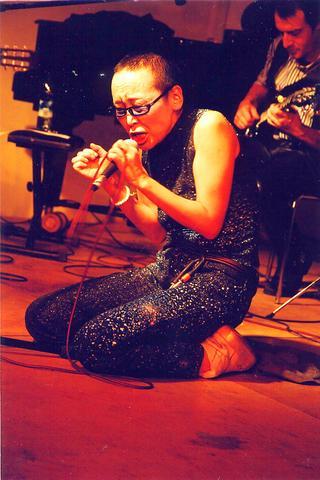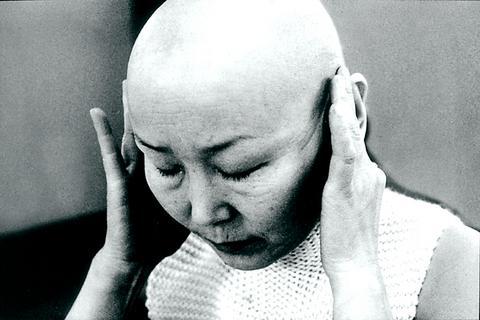Sometimes, Sainkho Namtchylak sounds like an opera tenor, with a clear and bright voice. At other times, her voice is like the singing of birds, or the prattle of a baby. Then she can chat like the crying of a crow, letting out exotic and intense feelings. That kind of variety in her vocals has earned her comparisons to artists such as Bjork, Zap Mama, Patti Smith, Nina Hagen or Maja Ratkje.
Yet her unique throat-singing technique and her experimental spirit, combining various music genres, has made her stand out as one of the few artists influential in both world music and electronic music.

Namtchylak hails from Tuva and comes this week to Taipei for two concerts -- one at the Zhongshan Hall and another at Corridor Cafe in the NTU Gymnasium -- and one music workshop, starting tomorrow.

PHOTO COURTESY OF THE ARTIST
For Taipei audiences, her show will be a rare chance to enjoy music while imagining the broad coniferous woods, the grasslands and the deserts of Tuva without flying all the way to the remote country located at the border of Siberia and Mongolia.
"For me, music has no boundaries. Especially for a time like now, it becomes more possible for us to let music dialogue with each other, crossing the realm of time, space and cultures," Namtchylak said in an interview from China.
Born in the Republic of Tuva in a family of nomadic ancestry, Namtchylak grew up singing and later studied vocals in Moscow. Apart from classical training, she also learned traditional Tuvan throat-singing (khoomei) and Tibetan Buddhist singing. In 1989, she first crossed into the European avant-garde improvisatory music scene, dedicating herself to expanding the potential of throat-singing in combination with various musical styles. The same year she worked and toured with former Soviet Union avant-garde jazz band Tri-O.
Since then, she's spent the past 15 years traveling around the globe spreading her unique sound that combines Tuvan throat-singing with various vocal techniques under the broad framework of jazz, improvisation, experimental and electronic music.
Namtchylak, who has 30 albums to her name, has worked with many outstanding musicians such as Peter Kowald, Ned Rothernberg, Evan Parker, William Parker, Hamid Drake, Djivan Gasparian, Otomo Yoshihide and Hakutobo.
Being one of the pioneers bringing Tuvan music to the Western world, Namtchylak is ironically not embraced by all her Tuvan countrymen.
Throat-singing is a special technique in which two notes are sung at the same time. There is a very strict gender taboo on throat singing in Tuva, restricting it traditionally to men only. In Tuva, Mongolia and Central Asian countries, it is believed that throat-singing leads to sterility in women.
Namchylak not only broke the tradition of "no throat-singing for women," but also having spent two decades living in the West, she is viewed at home as somewhat of a traitor of her country's traditional values.
In 1997, a few days before her 40th birthday, Namtchylak was physically assaulted and hospitalized in Moscow by a group of people claiming to be Tuvans.
The 2001 album Time Out was released after her rehabilitation from the assault. She wrote in the CD that the album is dedicated to Tuva and its people.
"I hope one day my fellow countrymen can understand, that I am an artist belonging to the whole world. The music I create has no boundaries," she said.
In a way, the allure of Namtchylak's music does not lie in her vocal virtuosity but her remaining true to the spirit of experimentation and breaking boundaries. For her two Taipei concerts, audiences will be able to appreciate just such a spirit. She is expected to perform tunes from her two well-received albums, Stepmother City (2000) and Who Stole the Sky (2003).
Performance Notes:
What: Sainkho Namtchylak
When: Tomorrow 7:30pm
Where: Zhongshan Hall, Taipei, 98, Yanping S Rd (
Tickets: NT$800 (available at Arts Ticketing outlets)
When: Sunday, 8:30pm
Where: Corridor Cafe of NTU Sports Center
Tickets: NT$500 (at the door from 8:00pm includes one drink)
Sainkho Namtchylak Masterclass:
When: Sunday, 2pm to 4pm at T305 Experimental Theater, Department of Theater, Taipei National Arts University, 1, Xueyuan Rd, Beitou, Taipei (

April 14 to April 20 In March 1947, Sising Katadrepan urged the government to drop the “high mountain people” (高山族) designation for Indigenous Taiwanese and refer to them as “Taiwan people” (台灣族). He considered the term derogatory, arguing that it made them sound like animals. The Taiwan Provincial Government agreed to stop using the term, stating that Indigenous Taiwanese suffered all sorts of discrimination and oppression under the Japanese and were forced to live in the mountains as outsiders to society. Now, under the new regime, they would be seen as equals, thus they should be henceforth

Last week, the the National Immigration Agency (NIA) told the legislature that more than 10,000 naturalized Taiwanese citizens from the People’s Republic of China (PRC) risked having their citizenship revoked if they failed to provide proof that they had renounced their Chinese household registration within the next three months. Renunciation is required under the Act Governing Relations Between the People of the Taiwan Area and the Mainland Area (臺灣地區與大陸地區人民關係條例), as amended in 2004, though it was only a legal requirement after 2000. Prior to that, it had been only an administrative requirement since the Nationality Act (國籍法) was established in

With over 80 works on display, this is Louise Bourgeois’ first solo show in Taiwan. Visitors are invited to traverse her world of love and hate, vengeance and acceptance, trauma and reconciliation. Dominating the entrance, the nine-foot-tall Crouching Spider (2003) greets visitors. The creature looms behind the glass facade, symbolic protector and gatekeeper to the intimate journey ahead. Bourgeois, best known for her giant spider sculptures, is one of the most influential artist of the twentieth century. Blending vulnerability and defiance through themes of sexuality, trauma and identity, her work reshaped the landscape of contemporary art with fearless honesty. “People are influenced by

Three big changes have transformed the landscape of Taiwan’s local patronage factions: Increasing Democratic Progressive Party (DPP) involvement, rising new factions and the Chinese Nationalist Party’s (KMT) significantly weakened control. GREEN FACTIONS It is said that “south of the Zhuoshui River (濁水溪), there is no blue-green divide,” meaning that from Yunlin County south there is no difference between KMT and DPP politicians. This is not always true, but there is more than a grain of truth to it. Traditionally, DPP factions are viewed as national entities, with their primary function to secure plum positions in the party and government. This is not unusual